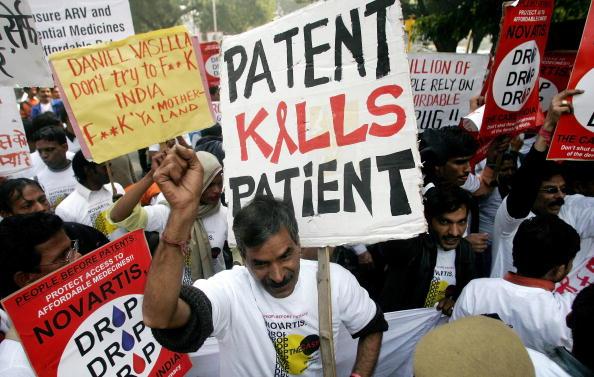India: Supreme Court denies patent for Novartis drug Gleevec
Indian people infected with HIV and activists hold placards and shout slogans against Swiss pharmaceutical firm Novartis during a demonstration in New Delhi, 29 January 2007. In recent days, India has proposed offering free generic drugs to patients who seek help at government health facilities.
NEW DELHI, India — India’s Supreme Court has rejected a bid from Swiss pharmaceutical company Novartis AG to patent an updated version of its cancer drug Gleevec (known as Glivec in Europe).
Patents allow companies to block competitors from making and selling the same product. The ruling means that Novartis can’t stop drug makers in India from manufacturing generic versions of Gleevec, which cost much less than the original.
According to the Guardian, Gleevec costs about $2,600 a month, while Indian copycat versions run just $175 a month.
By taking a strong position against "evergreening" patents, the court's ruling signals that India aims to protect its generic drug industry, despite adopting more stringent patent laws to conform with World Trade Organisation rules in 2005.
While that may cost India's fast growing research and development industry, it will come as a tremendous boon to ordinary people, potentially extending low-cost treatments from HIV — where Indian companies pioneered low-cost medicines by ignoring patents — to drugs for cancer and even chronic diseases like diabetes.
India’s patent law allows companies to patent medicines discovered after 1995, according to the New York Times. The court ruled that the version of Gleevec presented to them, while formulated after 1995, was not different enough from an early version of the drug that Novartis patented in 1993 and later abandoned.
Since the drug is not a novel invention, it does not qualify for patent protection, the judges said.
“The judgment in the Novartis case is a victory for patients both in India and around the world,” Dr. Yusuf K. Hamied, chairman of Indian generic drug company Cipla, told the New York Times. “India, being the pharmacy capital of the world, can continue to produce affordable, high-quality medicines without the threat of patents for minor modifications of known medicines.”
Novartis condemned the ruling in a statement, saying it “discourages innovative drug discovery essential to advancing medical science for patients.”
Aid groups and patient advocates cheered the decision. "The difference in price was huge,” YK Sapru, of the Mumbai-based cancer patients' association, told the Guardian. “The generic version makes it affordable to so many more poor people, not just in India, but across the world.”
More from GlobalPost: Apple denied iPad Mini trademark by US Patent and Trademark Office
Every day, reporters and producers at The World are hard at work bringing you human-centered news from across the globe. But we can’t do it without you. We need your support to ensure we can continue this work for another year.
Make a gift today, and you’ll help us unlock a matching gift of $67,000!
